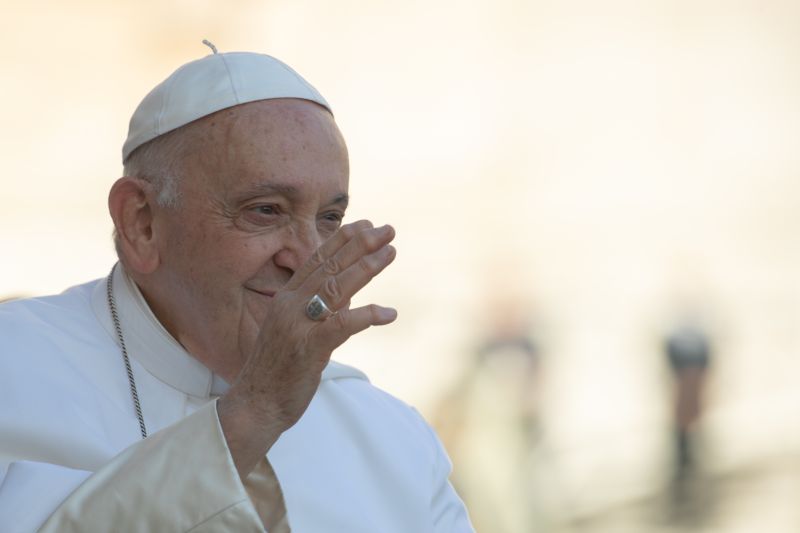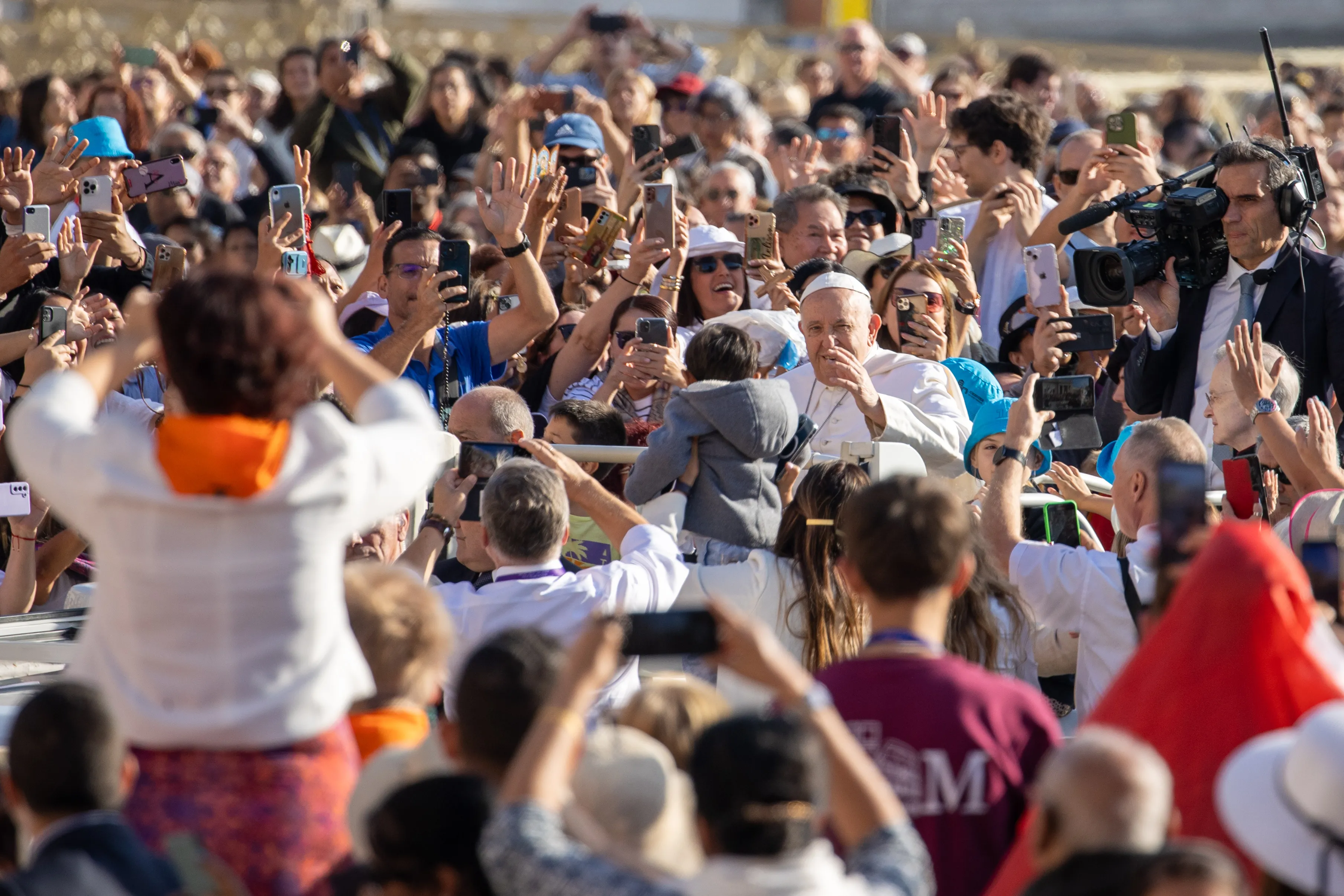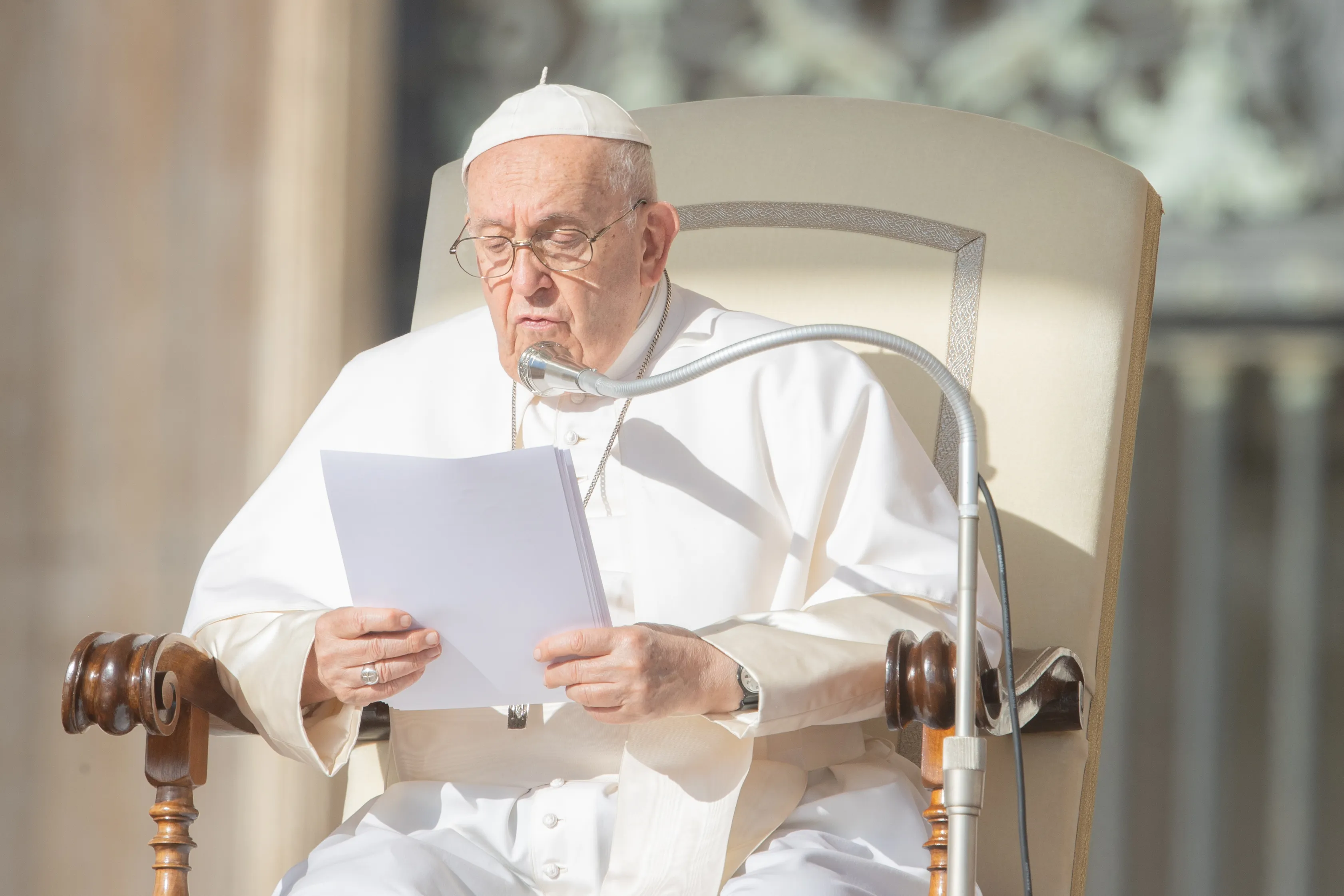
The list of grave issues that must be addressed during a future papal interregnum, and by the cardinal-electors in a conclave, continues to grow.
The finances of the Holy See are arguably in worse shape than at any time since the papal interregnum of 1922; then, money had to be borrowed to pay for the conclave as Benedict XV had virtually bankrupted the Vatican in his efforts to aid refugees and POWs during World War I. Notwithstanding the reforms Pope Francis has put into place, the Holy See now faces a vast, unfunded pension liability; incompetent investment management (and worse) has done serious damage to the Vatican balance sheet; and contributions, not least to Peter’s Pence, are down dramatically.
Then there is the Church in Germany, many of whose leaders seem bent on transforming German Catholicism into a form of liberal Protestantism. Is there any contested issue on which the great majority of the German bishops, and the lay leaders of the ongoing German “Synodal Way,” have not embraced the secular culture of lifestyle libertinism, rather than trying to convert it? Has the leadership of the German Church completely abandoned Vatican II’s teaching that Catholicism lives within certain doctrinal and moral boundaries?
There is also the festering wound of clerical sexual abuse, made worse by inept episcopal leadership in responding to these grave sins and crimes. The past several years have demonstrated that this crisis is by no means confined to the United States. In that same period, it has also become clear that too few national episcopates have adopted the practices of transparency and accountability that, despite limits and defects, now characterize the U.S. Church’s response to this societal plague.
And then there is the Holy See’s “foreign policy” and the assumptions that guide Holy See diplomacy.
How many informed Catholics and senior churchmen are willing to defend the Holy See’s current China policy, which has given the Chinese communist party a leading role in the selection of bishops? Very few, I would wager. Critical voices among bishops and cardinals may be muted, now, out of loyalty (or fear). But they are there, and they will be heard when a papal interregnum permits candor. And what those voices should (and likely will) say is that the current policy is an evangelical disaster. Irrespective of Vatican diplomats’ claim that “something had to be done,” the fact remains that what was done has violated the Church’s own canon law, demoralized Chinese Catholics loyal to Rome, failed to assuage the anti-Christian rancor of the Chinese regime, and created new opportunities for that regime to penetrate and control Chinese Catholicism. All of this has made Catholic evangelization in China far more difficult, even as Chinese Protestant communities continue to grow.
Then there was the recent situation in Belarus. On August 31, 2020, Archbishop Tadeusz Kondrusiewicz of Minsk-Mogilev, who had been visiting family in neighboring Poland, was blocked from reentering Belarus (his native land) by the thug regime of President Alexander Lukashenko. Kondrusiewicz had been supportive of the many Belarussians who were peacefully protesting what every objective observer knew was a rigged presidential election in early August of last year. Lukashenko and his thugocracy evidently took offense at this pastoral courage and cooked up excuses to punish Kondrusiewicz by keeping him out of his see.
The situation seemed to have been resolved when the archbishop was allowed back into Belarus to celebrate Christmas with his people, who received him with enthusiasm and veneration. But then on January 3, the very day he turned 75, Archbishop Kondrusiewicz’s canonically mandated letter of resignation was instantly accepted and an apostolic administrator named in his place. Did the two Vatican diplomats sent to Minsk to negotiate the archbishop’s return to Belarus – neither of whom is renowned for a capacity to stand up to thuggery – agree to a deal in which the Vatican would remove an irritant to the Lukashenko regime, if the regime would provide the fig leaf of a last Christmas in Minsk for the archbishop? It seems more than likely; indeed, it seems probable.
The current Vatican practice of attempting to appease thug regimes in the name of dialogue is doing serious damage to the Catholic Church’s international reputation as a proponent and defender of basic human rights. Even more importantly, it is hurting the Church’s evangelical mission. A Church that will not speak truth to power is not a Church that can credibly proclaim Jesus Christ, “the way, the truth, and the life” (John 14.6). Appeasement never works with thugs, politically. It doesn’t work evangelically, either.
If you value the news and views Catholic World Report provides, please consider donating to support our efforts. Your contribution will help us continue to make CWR available to all readers worldwide for free, without a subscription. Thank you for your generosity!
Click here for more information on donating to CWR. Click here to sign up for our newsletter.








I think the article has one glaring omission: the thug regime of Biden and his comrades in arms – the bishops of the USA, the Vatican, and the USCCB – all supporters of this abortion-promoting dictatorship.
I agree. Indeed, I thought it was going to be about the Biden govt. It is an excellent article on a topic not usually discussed at all but further comment is suggested on Biden’s govt, combining appeasement as a foreign policy with bullying (the heart of thuggery) as a domestic policy.
Pope Francis dialogues with dictators but refuses to clarify his confusing remarks to the faithful and refuses to answer the Dubia.
Good article. I can think of another thug regime which wants to codify the legalization of unrestricted abortion. And at this juncture, the Vatican appears to be quite content to accommodate it.
“A Church that will not speak truth to power is not a Church that can credibly proclaim Jesus Christ,…” Bravo Mr Weigel! But this declaration begs the question of why Vatican 2 was mute on the problem of Communism. Although V2 is sixty years in the past, its silence on the evils of Communism, Paul VI’s and Bergoglio’s compliance to the dictators, shows the enduring deep reticence– indeed skepticism–within the highest levels of the Church on its teaching mission to the poor slaves within the totalitarian prisons.
Not so. Pope John Paul was clear about communism, particularly as he had suffered atheistic totalitarian govt under Hitler and then the Soviets. I wish he were still in the Holy See but one cannot live forever. Remember Cardinal Mindszenty, whom John Paul received upon his release from the communists, who had been so excruciatingly tortured. There was no backing down there by the Vicar of Christ at that time.
Great article, George. May God assist us during this dark time within the Church, where it’s leadership seeks first the kingdoms of this world rather than the kingdom of Jesus Christ.
“Thug” is just too nice a term to describe this international phenomenon. This is the spirit of the anti-Christ. The conversation we must have is whether we oppose or embrace them. There is no middle ground. IMO the Pope has CHOSEN to support the anti-Christ and compromise the mission of the church.
The Pontiff Francis orchestrated idolatry in Rome in October 2019, brazenly showing his contempt for the 1st Commandment, after 6 years of showing his contempt for the 6th Commandment.
As reluctantly admitted by Father Imbelli in his recent essay “No Decpaitated Body” (published in summer 2020 in the journal Nova et Vetera, see link below) “there is abroad [i.e., abroad throughout the Church] a…quite intentional apostasy.” He was quoting his own words first written in 2000, and the ellipsis I use are in place of the “limiting qualifiers” which in 2020 he admitted must be deleted. He instead alluded to the 1975 observation by Henri de Lubac, of “the vast phenomenon of the Church’s self-destruction and inner apostasy.”
https://stpaulcenter.com/02-nv-18-3-imbelli/
The leaders of the Church, with few exceptions, cannot taken seriously right now. They do not have the voice of Christ The Good Shepherd.
If the Church in Germany is a 99% wreck, which it is, we ought not to be surprised when public apostate Bishops like Walter Kasper were made Cardinals by Pope John Paul II. In 1974, Kasper outright denied the bodily resurrection of Jesus, and numerous miracle accounts attested by the eye-witnesses of the Church and her evangelists.
The Church has proven itself over the last 50 years to be poorly ungoverned and seemingly ungovernable.
Real reform would be signalled by restoring the primacy of the Congregation for the Faith and dismantling and demoting the Vatican Secretariat of State, made supreme by Pope Paul VI in 1970, (demoting the Congregation for the Faith), and made a super-power by the Pontiff Francis.
But the trajectory of the Church since 1970 has veered away from the Faith, and instead, embraced world politics and power.
The results are the undeniable “vast self-destruction and inner apostasy,” personified by the Pontiff Francis.
A church that demotes the Faith to 2nd place (Paul VI in 1970) and now 3rd tier (Pontiff Francis reorganization) is sending a message that faith doesn’t really matter much to the leadership.
And thus…we are facing a choice between Jesus and the the Church leadership, who are the vanguard of “the vast apostasy.”
Another wonderful article by George Weigel. Gosh, your last 5 or so have been fabulous. I am now a Weigel convert. Time to look on Amazon. But please, you must do this: you have to get a new mugshot. The picture is just way too smug looking, but your writing is not smug at all. The picture just does not match the tone of the writing, which is controlled, professional, no sarcasm or cynicism, no whining, no hyperbole, not a whiff of arrogance, etc., and it is very hard to find Catholic writers who can pull that off today. You are one of the few. Take the plunge: send CWR a nice picture of you smiling, without the pseudo-Rodin posture, giving the false impression that you are looking down at the rest of us ignoramuses from on high.
I had assumed that Mr. Weigel was photographed playing chess, and had just noticed that his opponent had made a careless move.
I like that photograph! George Weigel is a very thoughtful man and that’s what it shows to me. (A lot more than thoughtful, for sure!) The plight of our Church and the world weighs heavily on his shoulders.
What a great article so forthright and true!!! Thank you George Weigel!!
Deacon Peter Kelly
A good account of non productive policy. That granted, if “informed Catholics and senior churchmen” are virtually unanimous, the account begs the question of motive. We may defend such a burlesque as the Vatican claim they secured the right to appoint bishops, when the CCP first selects all the candidates as an only remaining resort to avoid extinction. G Weigel alludes to Vatican financial troubles the CCP renowned for using cash donations as policy incentive. Weigel rightly and righteously responds to either or with, “A Church that will not speak truth to power is not a Church that can credibly proclaim Jesus Christ”. Image is vital appearances must be kept so speaks Madison Avenue. Perhaps the rationale for a makeover Vatican Dicastery for Communications [should I with bias add here the charade claim of doctrinal integrity in Vatican acquiescence to open season communion Malta, Sicily, the Philippines, Deutschland? Okay I won’t]. However it pans out the world will likely give a wink and a nod at a so pretentious Vatican burlesque politik. We simply cannot reconfigure Christ’s radical unmistakable portrait.
“Critical voices among bishops and cardinals may be muted now, out of loyalty (or fear).” This is a very sad (but true) comment on our bishops. And then, “But they are there, and they will be heard when a papal interregnum permits candor.” I see no reason at all to believe this will happen.
The pope decided to allow the communists some voice in appointing Bishops in a misguided attempt to make the situation there better for the church.It did not. If anything it allowed the communists a credibility they did not have before. Having discovered it was false promises ( churches demolished, church goers arrested, etc) the Pope should have pulled the plug on the deal. In the US and elsewhere he seems to operate on the same principle, being fearful that applying truth and discipline will result in insurrection and/or folks voting with their wallets. Well,the church is already teetering and the wallets have been shut for some time.The unwillingness of the Bishops to speak out well before the election was a major disappointment. That many Catholics betrayed their teachings and voted for pro-abortion Biden is just as sad. Lack of firm statements from the hierarchy has much to do with this. Time for the Pope ( and the Bishops) to tell people the plain truth, whether or not they want to hear it. Or resign and allow a pope with more spine to be elected and LEAD .A smaller more faithful church might not be the end of the world. If you want to live the secular life in all ways, and be told that’s fine, there is not much point in being a Catholic or a Christian. Don’t pretend you are one if you are NOT.
I, too, was disappointed that a number of bishops were silent before the election, while simultaneously placing covid restrictions on Mass in direct violation of canon laws and basic rights. It’s like in the past year we’ve been hit with a double-whammy. And so many useful idiots are now emboldened. I definitely feel like my Church is being pushed to the brink.
The interregnum will be predominantly Bergoglio appointees. They like what Francis is doing. That’s why they got the gig. Why would they see the need to address these issues? I suspect most are in tow with Germany, prefer to appease China, follow Francis’ deplorable example on sex abuse, don’t understand how economies function, would rather cower before depots, and see no need to stand for our Catholic faith, to wit, how they deal with Biden. Pipe dreams, Weigel. This Jesuit has done incredible damage to the Church for generations to come.
The fault of all this trouble in the Church goes back to the Second Vatican Council. St. Pope John XXlll had 9 excellent Schemata prepared for the Council. The Council would have been as great as the Council of Trent. Pope John’s Council could have been called The Second Council of Trent. I quote here from the book “Letters from Vatican City” by Xavier Rynne This is when Cardinal Bea led the Council Fathers to dump the Council of Pope John XXlll, words of Cardinal Bea, “There is no need now for patristic or theological arguments. What our times demand is a pastoral approach, demonstrating the love and kindness that flow from our religion… it is not the Councils business to do the work of exegetes; to solve problems of inspiration, authorship or inerrancy.. The Schemata must be radically redone to render it shorter clearer and more pastoral”. This was the beginning of the Modernist takeover of the Church. St. John XXlll after this, “He called his closest Cardinal Collaborators together to think of a way to gracefully end the Council as he saw trouble ahead.” This from an interview I saw on TV about 15 years ago of an aged Cardinal who was one of Pope John’s closest collaborators. God speed to Archbishop Vigano.
Wonderful article Mr. Weigel. You always manage to be insightful, clear, balanced and charitable. I wish I could say the same about some of the comments that follow your articles!
One longs for the days of Pius XII and the excommunication of the miscreant thugs and the proscription of those not Catholic. Whether it eventually brought their souls to truth is uncertain but it is certain that the moral position of the Church was quite clear.